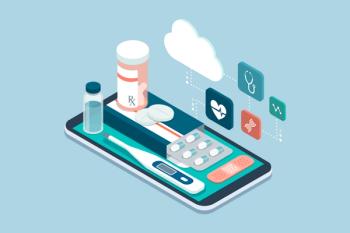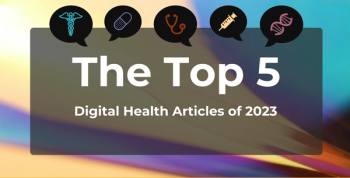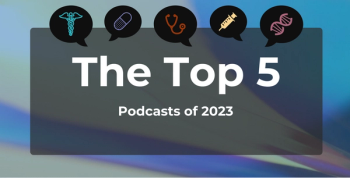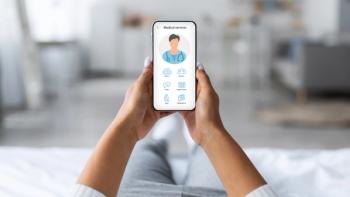
Digital Health
Latest News
Latest Videos

Shorts

Podcasts
More News

The program works by embedding Medbridge’s Pathways platform into Marathon’s MoveWell MSK program and advanced primary care model.

In this second half of our interview with Vanderbilt University Medical Center’s Travis Osterman, DO, MS, FAMIA, FASCO, he discusses opportunities for advancing the smart use of artificial intelligence (AI) in cancer care.

Health care apps like MyChart, mySugr, GoodRx, and Smoke Free can enhance patient care through accessibility, convenience, and engagement, but further discussion is warranted on the optimal use of these apps.

A study finds that telehealth does not lead to an increase in wasteful, low-value care and may even reduce unnecessary tests and procedures.

Co-pay accumulators and maximizers are 2 programs that insurers have started implementing to help them redirect financial assistance from the patient, said Kimberly Westrich, MA, chief strategy officer, National Pharmaceutical Council.

This evaluation looks at a postdischarge digital engagement (PDDE) program using causal inference methods to examine the impact of PDDE on readmission.

The most-read articles in digital health covered improved outcomes, patient management, and reduced cost of care in telehealth and app-based care.

This year’s top 5 most-listened to podcasts included topics on digital health solutions, cardiology, value-based care initiatives, and oncology.

CDC revealed nationally representative estimates of chronic fatigue; the proposed merger between Cigna and Humana has been terminated over financial terms and shareholder skepticism; ChatGPT provides inaccurate responses to medication queries.

Given its growing significance in health care, there is an increasing need for digital research ethics and appropriate consent methods, according to one study.

At 12 weeks, significantly more patients with fibromyalgia receiving the smartphone-based intervention reported clinical improvements compared with the control group.

ChatGPT is changing health care while also raising questions about artificial intelligence's promises and limitations; 24 Biden officials met with the National Organization of Black Law Enforcement Executives to discuss the FDA’s proposal to ban menthol cigarettes; a recent hospital cyberattack shows how the vulnerability of health care systems can put patients at risk.

Governor Kathy Hochul proposed this week that New York become the first state to require health systems to implement cyber defenses; a new report from the World Health Organization and the CDC highlighted a staggering rise in measles cases and deaths in 2022; a study published this week claimed that more than a tenth of fecal immunochemical tests used for routine colorectal cancer screening could not be processed by labs.

Although telehealth is broadly accepted as a mode of cancer rehabilitation, accessibility and in-person challenges exist.

This qualitative study elucidates therapists’ perspectives on barriers to and facilitators of access to telemental health among Medicaid-enrolled youth served by a large safety-net organization.

A senator opposes the Biden drug price negotiation plan and proposes a new model to help manage weight loss drug costs; Black children are underdiagnosed with attention-deficit/hyperactivity disorder (ADHD) compared with their White peers; lawmakers and witnesses said that policy makers must balance innovation with potential harms when it comes to artificial intelligence (AI) in health care.

Despite the growing availability of prescription digital therapeutics (PDTs) coming to market, few products have gone through rigorous standards of evidence testing, according to one study.

Toku’s platform aims to deliver real-time cardiovascular disease (CVD) risk assessments using routine eye exams.

Although they cannot address all concerns, on-demand digital health solutions offer personalized support for patients in need of care after normal business hours.

Adults with osteoarthritis who took part in a digital musculoskeletal program had lower rates of knee and hip arthroplasty at 12 months vs those using traditional care.

Although all legislation is currently on hold in Congress, there are important actions under consideration for pharmacy, including digital therapeutics, access to care, and health care disparities.

A growing availability of treatment options for digital therapeutics (DTx) requires expanding access and coverage, according to payers in the United States.

Clinical-grade, expert-supported natural language processing (NLP) is valuable to payers and providers when exchanging patient information through continuity-of-care documents.

The COVID-19 pandemic has highlighted the importance of remote cancer care, in which notable gaps in care should be addressed, according to a new study.

Lisa Rometty, CEO at Zerigo Health, discusses the challenges and opportunities for growth within the digital health landscape, as well as how Zerigo plans to collaborate with patients and payers to make sure digital health tools are accessible and affordable.


















